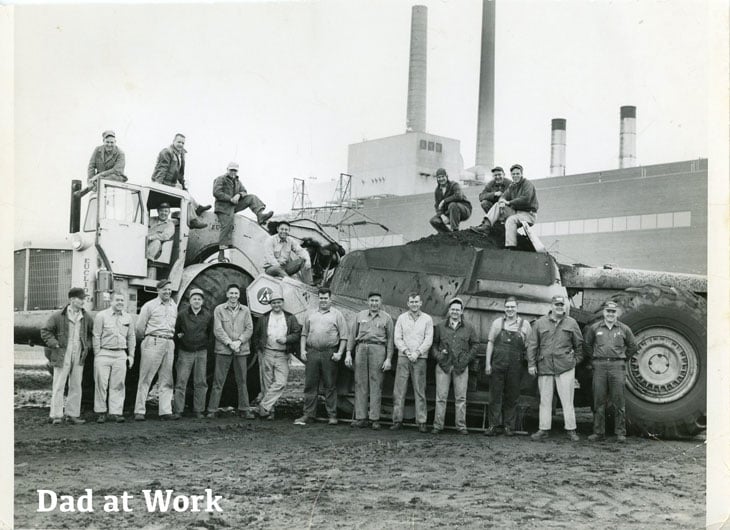
Reflections on Leadership: Finding a Portable Passion
As I write this Reflection it is 4 degrees outside my home in Central Pennsylvania. In this frigid environment my thoughts return to my childhood in Port Huron, Michigan where these temperatures were more common. It is still cold there, but not as cold as I remember it to be as a child. The photo (above), taken by Doug McLean, is of an ice covered tree near the Blue Water Bridge that connects Port Huron with Sarnia, Canada. The wind swept ice covering has the appearance of a group of angels looking over the water toward the U.S., and ships passing on the St. Clair River.
The photo (above), taken by Doug McLean, is of an ice covered tree near the Blue Water Bridge that connects Port Huron with Sarnia, Canada. The wind swept ice covering has the appearance of a group of angels looking over the water toward the U.S., and ships passing on the St. Clair River.
These were the conditions that my Dad worked in as a heavy equipment operator for Detroit Edison. When you are operating a bulldozer at the top of a coal pile 75 to 100 feet in the air right next to the St. Clair River, harsh conditions are a fact of life.
Whenever the coal would freeze and stick to the walls of the bunkers that fed the coal into the plant, the work involved the use of sledge hammers to loosen the frozen coal to keep the fires burning.
They were good, hard working men, whose bodies were eventually worn down by the rigors of physical labor. My Dad’s expectations of work were relatively modest. We never talked about a job being fulfilling or making an impact. Even as I considered what course to follow in higher education or in life, finding your passion in work was not a subject discussed at our kitchen table.  My recollection is that in spite of the hardships, he enjoyed the people he worked with and found the work to be rewarding. Later in life his passion and work merged in a call to ministry in small, country churches in the thumb area of Michigan.
My recollection is that in spite of the hardships, he enjoyed the people he worked with and found the work to be rewarding. Later in life his passion and work merged in a call to ministry in small, country churches in the thumb area of Michigan.
Find your passion. In the leadership classes that I teach to the Presbyterian Senior Living staff, we often talk about the journey that led to where they are now. My journey with Presbyterian Senior Living is expressed in the Reflections on Leadership Book that is used as our text.
Their personal stories are unique, inspiring, and filled with unexpected twists and turns. I hear of people who started out in life intending to go into a career in finance or graphic design who became nurses. Others talk about the influence of someone who noticed a particular talent and encouraged them to think bigger. Spurred by that timely encouragement, they ultimately found their life’s calling and passion.
Unfortunately, finding your passion is not an easy task. In his viral YouTube on millennials, Simon Sinek offers a bleak assessment of the unmet expectations of young people entering the workforce and how they will experience life.
He believes that it is possible that an entire generation may go through life never really finding joy or deep fulfillment in work or in life. According to Sinek, the roots of this problem are rather complex. Parenting, technology, impatience, and environment all play a role in this unfortunate circumstance.
In his book, Second Innocence, John Izzo describes the feeling of being trapped, working part time in a post office at a job that he considered to be both tiring and irritating. While he was miserable and longed to do something important, his friend Joe Hughes seemed to find joy in the same work.
One day a customer came into the post office, and John absentmindedly inquired about how she was doing. She responded that her daughter was in the hospital, dying of cancer and she had to pay her rent by 5:00 pm or be evicted. The owners of her building would not take cash, so she was in the post office getting a money order so she could be with her dying daughter. Izzo continues:
Some 25 years later I cannot recall the specific words I said to her that day. I do know that for the first time in six months it occurred to me that I might actually have made a difference in the post office. After an exchange of kind and tender words she headed off, but at the door she stopped and turned around. Stepping back to my counter, putting her small, feeble hand on my young forearm, she looked deeply into my eyes: “Son, I just want to thank you. Thank you for being so kind. You do know that you made my day.”
That night the sleep would not come. Her words kept ringing in my ears, “You made my day”. For months I had seen my job at the post office as licking stamps and weighing things. Could it be that during that time that there had been a deeper calling? What would have happened if I had thought about my job as making people’s days?
This experience was a revelation for Izzo, and he began to change his behavior. He also understood why his friend Joe Hughes saw his work in a much more positive light. As fate would have it, Joe Hughes and John Izzo finished their work at the post office the same week. Izzo’s departure was hardly noticed, but the customers threw a going away party for Joe Hughes. What was the difference? Izzo explains:
By then I knew why. For Joe the post office was a part of his ministry. He knew that wherever people gathered, whatever your job description said that you were supposed to be doing, you were there to make lives better – and it showed. The job in the post office was not too small for me. I was too small for the job.
In the context of a generation in search of finding their passion at work, I believe that there is another lesson here. John Izzo was disappointed in his job because he did not consider it to be in line with his passion. Joe Hughes brought his passion with him to work and turned his workplace into something special.
Rather than look for the perfect job to satisfy his passion, Joe added the ingredient of passion into his daily work. John Izzo does not tell us what happened to Joe Hughes later in life. But I get the sense that no matter where Joe happened to work, he was able to find joy and fulfillment in work and in life.  It is important to find work that is meaningful and worthy of our time and attention. But what we need beyond that is a passion that transcends a chosen occupation or specific workplace. We all need a passion that is portable.
It is important to find work that is meaningful and worthy of our time and attention. But what we need beyond that is a passion that transcends a chosen occupation or specific workplace. We all need a passion that is portable.
The Apostle Paul described this in his letter to the Colossians - “And whatsoever you do, do it heartily, as to the Lord, and not unto men.” The effectiveness of this approach has been confirmed in my life experience.
From my time as an orderly in a Sisters of Mercy Hospital, chauffeur, Nurse, and all the position changes that followed in my 47 years with Presbyterian Senior Living, joy and fulfillment have been my constant companions. Not every day was perfect or free of hardship, but an underlying passion has sustained me through those dry periods.
What does this mean for those of us in leadership positions? First and foremost, as leaders we need to recognize that at the beginning of every day we have the opportunity to be John Izzo or Joe Hughes, and the people we work with know which choice we made by observing our behavior.
Our greatest impact can be achieved by the way we model passion and enthusiasm in our day to day work. If you want to be an effective leader, bring your passion to work and freely share it with others.
About Steve Proctor
As the now-retired CEO of Presbyterian Senior Living, Mr. Proctor was employed by PSL from 1971 - 2019. He is a Registered Nurse and Licensed Nursing Home Administrator with a BS degree in business administration from Elizabethtown College. He also holds a master’s degree in gerontology from the University of North Texas. Before becoming CEO, Mr. Proctor was Chief Operating Officer for 16 years. In addition, he has served as a Board member and is a Past President of the Pennsylvania Association of Non-Profit Homes for the Aging (“PANPHA”). In November of 1995, the American Association of Homes and Services for the Aging (“AAHSA”), now known as LeadingAge, recognized Mr. Proctor’s proven leadership and accomplishments by electing him to serve as Chair of its national board of directors. He served as Chair-elect in 1996 and 1997, as Chair in 1998 and 1999, and as past-Chair in 2000 and 2001. He has also served as chair of the International Association of Homes and Services for the Aging.

